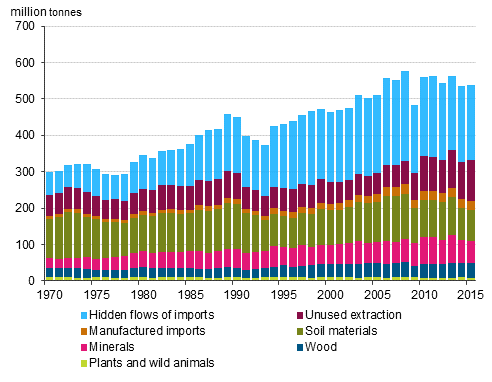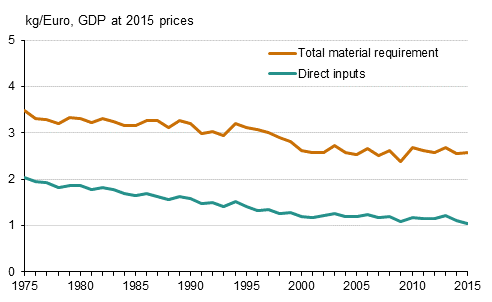Published: 17 November 2016
Need for material decreases slowly
In 2015, altogether 277 million tonnes of material was extracted from the soil and vegetation of Finland. Forty-four per cent of this material was used domestically and 15 per cent was exported. The rest, or good one-third, was left unused in nature. In addition, some 54 million tonnes of products and raw materials were imported, which generated an estimated 208 million tonnes in hidden flows for the production countries. All in all, Finns’ material extraction in 2015 amounted to 540 million tonnes. The amount is roughly the same as annual oil production in Russia. Changes compared to 2014 were minor apart from ore extraction, which is on the rise again.
Total material requirement by material group in 1970 to 2015

Both in Finland and throughout Europe, national economies try, in the spirit of circular economy, to lower their material intensity or their economy’s dependency on natural resources, or vice versa, to increase the productivity of their natural resources. The dependency of Finland’s national economy on nature is significantly larger than in the EU, on average, the average material productivity in the EU was more than double compared to Finland. Halving of direct natural resource inputs to produce one euro has taken 40 years in Finland. At this rate, we will reach the EU average in four to five decades.
Material intensity of Finland's economy in 1975 to 2015

Source: Economy-wide material flow accounts 2015, Statistics Finland
Inquiries: Simo Vahvelainen 029 551 3457, Leo Kolttola 029 551 3234, Jukka Muukkonen 029 551 3224, environmental.accounts@stat.fi
Director in charge: Ville Vertanen
Publication in pdf-format (210.1 kB)
- Tables
-
Tables in databases
Pick the data you need into tables, view the data as graphs, or download the data for your use.
Appendix tables
Updated 17.11.2016
Official Statistics of Finland (OSF):
Economy-wide material flow accounts [e-publication].
ISSN=2242-1289. 2015. Helsinki: Statistics Finland [referred: 19.4.2025].
Access method: http://stat.fi/til/kanma/2015/kanma_2015_2016-11-17_tie_001_en.html

